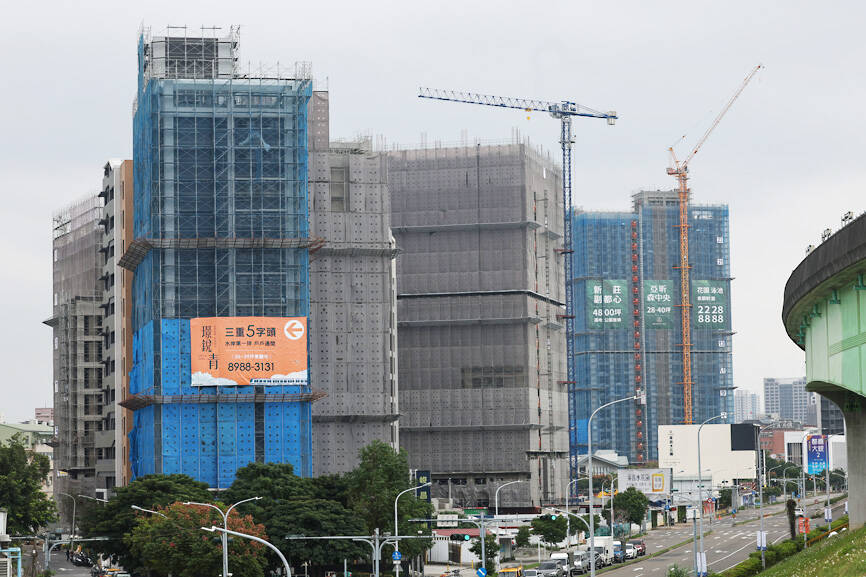Taiwanese manufacturers were last month slightly more negative about their business prospects for the coming six months, as a supply glut continued to plague petrochemical suppliers and electronics makers remained cautious largely about end-market demand, the Taiwan Institute of Economic Research (TIER, 台灣經濟研究院) said yesterday.
The manufacturers’ confidence reading shed 0.57 points to 93.2, as the global economy showed signs of improvement, but at a slow pace, limiting room for selling prices to increase, the institute said.
Petrochemical makers were especially affected, as they had to cope with rapid capacity expansion from Chinese competitors and extended anti-dumping duties imposed by China, it said.

Photo: CNA
Although the US Federal Reserve recently indicated that its monetary tightening cycle is nearing an end, the impact of high interest rates would linger for quarters to come, which would be bad news for consumer spending in the US, the main end-market for technology products, TIER economist Gordon Sun (孫明德) said.
Manufacturing business sentiment also took a hit from geopolitical tensions linked to attacks by Yemen’s Houthi militants on cargo ships in the Red Sea, Sun said.
That helped explain why more than 60 percent of chemical and petrochemical suppliers are expecting a decline in business over the next six months, although global semiconductor inventory has returned to healthy levels, TIER said.
However, the economy would perform better next year due to restocking demand that would shore up global trade, as well as Taiwan’s exports and private investment, TIER president Chang Chien-yi (張建一) said.
Meanwhile, the local service sector’s confidence gauge reached 91.17 last month, up 1.37 points and reversing three previous months of declines, the institute said.
Retailers, restaurants, logistics providers, life insurers and securities brokerages were all positive about their business outlook, while banking institutions were neutral, it said.
Construction firms and property brokers registered a collective confidence score of 102.82, up 3.42 points from a month earlier, TIER said.
The improvement had a lot to do with the traditional high season for new house deliveries being near the end of the year and a continued increase in first-home purchases, as people were taking advantage of preferential lending terms, Chang said.
The government introduced the stimulus measure in August to support people with real demand, while raising holding costs for multiple home owners and short-term property investors.

The US dollar was trading at NT$29.7 at 10am today on the Taipei Foreign Exchange, as the New Taiwan dollar gained NT$1.364 from the previous close last week. The NT dollar continued to rise today, after surging 3.07 percent on Friday. After opening at NT$30.91, the NT dollar gained more than NT$1 in just 15 minutes, briefly passing the NT$30 mark. Before the US Department of the Treasury's semi-annual currency report came out, expectations that the NT dollar would keep rising were already building. The NT dollar on Friday closed at NT$31.064, up by NT$0.953 — a 3.07 percent single-day gain. Today,

‘SHORT TERM’: The local currency would likely remain strong in the near term, driven by anticipated US trade pressure, capital inflows and expectations of a US Fed rate cut The US dollar is expected to fall below NT$30 in the near term, as traders anticipate increased pressure from Washington for Taiwan to allow the New Taiwan dollar to appreciate, Cathay United Bank (國泰世華銀行) chief economist Lin Chi-chao (林啟超) said. Following a sharp drop in the greenback against the NT dollar on Friday, Lin told the Central News Agency that the local currency is likely to remain strong in the short term, driven in part by market psychology surrounding anticipated US policy pressure. On Friday, the US dollar fell NT$0.953, or 3.07 percent, closing at NT$31.064 — its lowest level since Jan.

The New Taiwan dollar and Taiwanese stocks surged on signs that trade tensions between the world’s top two economies might start easing and as US tech earnings boosted the outlook of the nation’s semiconductor exports. The NT dollar strengthened as much as 3.8 percent versus the US dollar to 30.815, the biggest intraday gain since January 2011, closing at NT$31.064. The benchmark TAIEX jumped 2.73 percent to outperform the region’s equity gauges. Outlook for global trade improved after China said it is assessing possible trade talks with the US, providing a boost for the nation’s currency and shares. As the NT dollar

The Financial Supervisory Commission (FSC) yesterday met with some of the nation’s largest insurance companies as a skyrocketing New Taiwan dollar piles pressure on their hundreds of billions of dollars in US bond investments. The commission has asked some life insurance firms, among the biggest Asian holders of US debt, to discuss how the rapidly strengthening NT dollar has impacted their operations, people familiar with the matter said. The meeting took place as the NT dollar jumped as much as 5 percent yesterday, its biggest intraday gain in more than three decades. The local currency surged as exporters rushed to